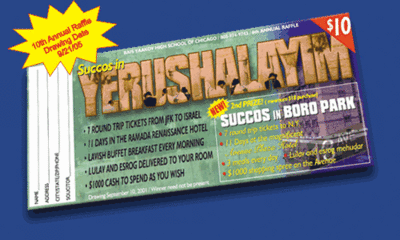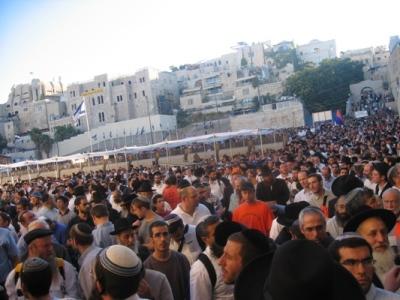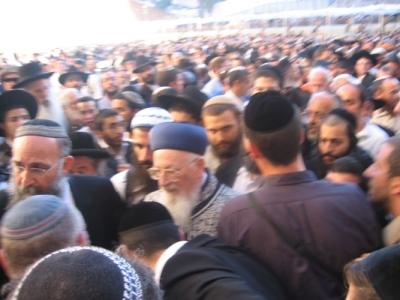 Today, the 19th of Av, is the Yartzeit of Rav Yaakov Culi ZT”L, the conceiver and original author of the Holy Work, the “MeAm Lo’ez.” In honor of this we present a short excerpt from the MeAm Lo’ez on last week’s Parsha as translated by Rav Aryeh Kaplan A”H. (This section was not written by Rav Culi but by Rav Yitzchok Behar Argueti ZT”L, however it is in line with Rav Culi’s vision of the massive “MeAm Lo’ez” project.)
Today, the 19th of Av, is the Yartzeit of Rav Yaakov Culi ZT”L, the conceiver and original author of the Holy Work, the “MeAm Lo’ez.” In honor of this we present a short excerpt from the MeAm Lo’ez on last week’s Parsha as translated by Rav Aryeh Kaplan A”H. (This section was not written by Rav Culi but by Rav Yitzchok Behar Argueti ZT”L, however it is in line with Rav Culi’s vision of the massive “MeAm Lo’ez” project.)
The Advantages of Living in the Land of Israel
From here we see the advantages of living in the land of Israel and its holiness. Moses prayed repeatedly to be allowed to enter the land of Israel and to be able to live there. We likewise find that the patriarchs all lived in the Holy Land.
The reason is that Israel is not directed by any angel, but by G-d Himself. It is thus written, “It is a land about which L-rd your G-d is constantly concerned” (Deut. 11, 12). Even when people sin very much, G-d does not give it over to the angles of destruction for punishment, so that they should not have any power over it.
Our sages teach, “The land of Israel makes one wise in Torah. This is because all this land, all the air as high as one goes, is not given to the power of any destructive angel which can confuse the mind and blind the eyes so that one will not understand the Torah.”
It is thus written, “The gold of that land is good, there is the bdellium and the onyx stones” (Genesis 2:12). There is no Torah study like that found in the land of Israel.
The logical inferences and mental structures that one can arrive at in the Holy Land are better and greater than that of any other place. This is the “gold of the Holy Land.”
The bdellium (bedolach) and onyx (shoham) stones denote erudition in Talmud, Tosfta, and Aggadah.
The Torah is likened to gold, as it is written, “It is more precious than gold and the finest gilt” (Psalms 19:11). It is also likened to precious stones as it is written, “It is more precious than jewels” (Proverbs 3:14).
The reason is as we have said earlier, that there are not destructive angles in the Holy Land to confuse the mind, and the Divine Presence also rests there.
Abbaye who was one of the greatest sages in Bavel praised the sages of the land of Israel and said, “One sage there is as good as two of our sages in wisdom and sharpness. Since they live in the land of Israel the air there helps sharpen their minds. This does not indicate that we are lacking any mental agility, but the very air and holiness of that land makes them wise.”
His contemporary, Rava, said “If one goes there (to the Holy Land), two of them are not like one of us.” The proof is that when Rav Jeremiah, from the Holy Land was here, he could not understand what our sages taught. But when he went to the Holy Land he did not consider us great at all and he called us ‘foolish Babylonians.’” (Talmud Ketubot 75a)
This is even true with regard to other subjects. The people who live in the Holy Land are much sharper.
When a person left Jerusalem and came to another city, even if he was an ordinary person, the gentiles gave him much honor and placed him on a throne and set him down to hear his wisdom and his knowledge of all types of science as well as his understanding. (Midrash Echah I)
Therefore, G-d chose the Holy Land and gave it to us. G-d said, “This land is very dear to Me. It is not directed by any angelic overseer, but by My hand. The Israelites are also precious to Me as it is written, ‘Out of G-d’s love for you. . .’ (Deut. 7:8).” The Israelites are also not directed by any angel but by G-d Himself as it is written, “For G-d’s portion is His people” (Deuteronomy 32:9). G-d said, “I will bring the Israelites who are precious to Me to the land that is precious to Me.”
Similarly, it is taught that “Whoever lives in the land of Israel is like one who has a G-d.” This is because as soon as he prays he is answered, since no angelic being can denounce his prayers. Similarly, it is taught “Whoever lives outside the land is like one who does not have a G-d.” When such a person prays because of any trouble, many denouncing angels hold back his prayers and examine him to see if [his] prayer should ascend on High. If they see that it is not fitting he can call out and not be answered.
Whoever is worthy to live in the land of Israel is worthy of having the Holy Spirit (ruach ha-kodesh) rest on him and his body is sanctified. If one is worthy of dying in the land of Israel, his soul immediately ascends to its place under the wings of the Shekhinah.
If a person is worthy of living in the land of Israel it is a sign that he is a righteous person.
Such a person automatically has a portion in the World to Come, even though people do not deem him to be a virtuous person. However, if he was not saintly, the land would not accept him but would emit him as it is written [the Torah says that if people commit sins “the land will vomit you out” (Leviticus 18:28)]. Just as a stomach vomits out improper food the land vomits out improper individuals.
The reason for this is that if a person lives in the land of Israel he is without sin. The suffering that he experiences there atones for all his sins. His body is therefore cleansed of sin, since he lives in a place where the Divine Presence rests and therefore his body must be pure.
Therefore if a person is not ready to keep the commandments when he is in the land of Israel, his sin is greater than that of a similar person in other lands. It is like two people whom the king commanded to do something. One lives in the king’s palace and the other lives outside the palace. If the two of them then violate the king’s commandment, with whom will the king be more angry? Certainly he will be more angry with the one who lives in his palace and sees the king every day. The anger will be greater than against the one who lives outside the palace even though both of them violated the commandment. Still, the punishment for the one who lives in the palace is greater.
Although our sages teach, “Whoever walks four cubits in the land Israel atones for all his sins,” and the land itself has the power to atone for sin, it is only true if someone comes from outside the land of Israel. Then as soon as he steps on the ground of the land of Israel and walks four cubits his sins are forgiven, as it is written “His land shall atone for His people” (Deuteronomy 32:43). However if a person commits sins while in the Holy Land itself, the punishment is much worse than while elsewhere. If a person is buried in the land of Israel it is exactly the same as if he were buried under the altar, which was the place where all sin was forgiven through the sacrifices. Therefore happy are the righteous who live in the land of Israel, since they have no sin either in life or death. The land itself has a special power of atoning for a person’s sin.
Living in the land of Israel is as weighty a merit as the covenant of circumcision.
It is as weighty as everything that was created in the six days of creation. We find that Elimelech was punished with his two sons, Machlon and Chilyon (see Ruth 1, 3, and 5) because they left the land of Israel and lived elsewhere because of the famine that was there.
The Talmud relates that Rabbi Eleazar ben Shamua and Rabbi Yochanan HaSandler once left the Holy Land to study Torah with Rabbi Yehudah ben Bethirah, who lived in Netzivin in Babylonia. When they came as far a Tzarda, they looked up and saw the land of Israel. They remembered that living in the Holy Land is equivalent to all the rest of the commandments. Immediately, they tore their garments and tears gushed down their eyes. With that they returned to the Holy Land.
When a person lives in the land of Israel he is like a child of G-d. If a person lives outside the land of Israel he is like G-d’s servant. The difference between these two appellations is explained in the beginning of the Sidra [Vaethchanan].
The righteous who live in the land of Israel have such power that their merit protects even those that live outside the Holy Land. However the righteous outside the land of Israel only protects those who live in their place.
The reason for this is that there are seven zones in the world. The land of Israel is at the middle ot these seven regions, three to the right and three to the left. Matching these, G-d created the seven major planets, Saturn (Shabethai), Jupiter (Tzedek), Mars (Ma’adim), the Sun (Chamah), Venus (Nogah), Mercury (Kokhav), the Moon (Levanah). Each one of these bodies directs one zone. Essential to all these seven bodies is the sun. Just as the sun shines over the world, so the spiritual influx that G-d sends to the Holy Land is enjoyed by the entire world. People who live in the Holy Land are like a wife whose eyes are fixed on her husband. Therefore the merit of the saints in the land of Israel protects even those who live outside the land. It is like the case of the heart which feeds all parts of the body.
When the Temple existed and we were in our own land, all blessing and bounty came from G-d’s hand, while the other nations only had what was left over, like a slave dependent on his master. However, now, due to our sins, this has changed. G-d gives all good to the nations and we can only hope for what they leave over. However, even now when the Temple is destroyed and the land is desolate, through the merit of the land of Israel all the world is fed.
The land of Israel is known as the land of the living (eretz ha-chaim). At the resurrection, the dead in the land of Israel will rise first. Even Jeroboam and his associates who sinned and caused others to sin will rise. Although they committed the worst possible sins, they will be the first to rise before all the other dead. They already received their punishment when Jerusalem was destroyed and the earth burnt seven years with fire and brimstone. Since G-d has already punished them, they will rise at the resurrection. Moreover, in the merit of their having been buried in the land of Israel they will be saved from the punishment of hell, as we have mentioned. The land has the power to atone as it is written, “His land shall atone for His people” (32:43).
Those who die in the Holy Land also have another advantage in that they die through an angel of mercy. Those who die elsewhere, on the other hand, die through the angel of death.
If a person has a relative in Jerusalem, whether a man or woman, and he is concerned to provide them with food, he has a special merit. This is especially true of those who exert themselves to support Torah sages who live and study Torah in the land of Israel. In the merit of this relative or the Torah scholar, the person who supports them will be among the first to rise at the resurrection.
The land of Israel was sanctified with ten degrees of holiness, one above the other. To match these ten degrees of holiness, when Ezra arrived in Jerusalem from Babylonia, he made ten enactments. Joshua likewise made ten conditions when he entered the Holy Land. These also correspond to the ten degrees of holiness in the land.

The MeAm Loez is published in English by Moznaim.
 Photo Blog: Planting, Not Uprooting!
Photo Blog: Planting, Not Uprooting!












